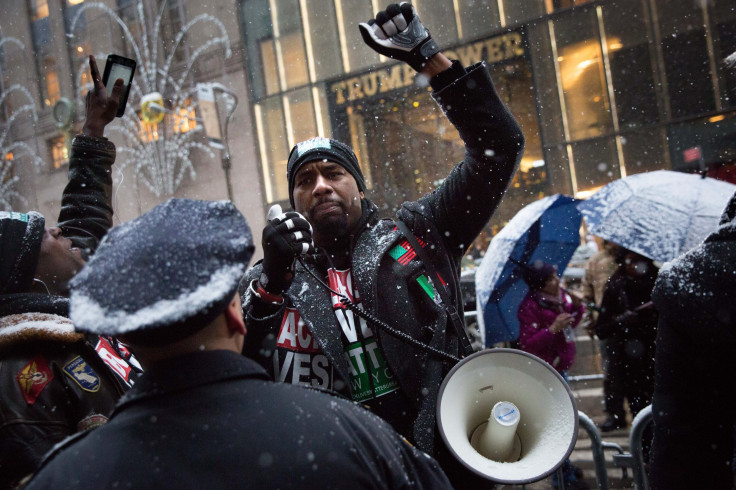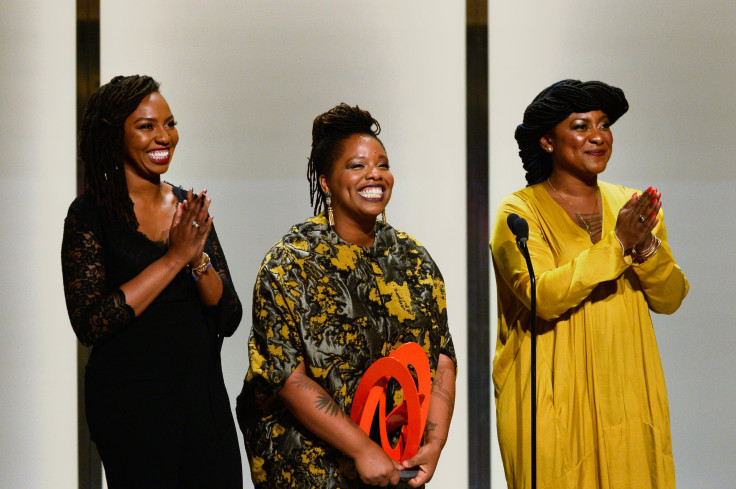Black Lives Matter Founder Alicia Garza: 'Donald Trump Is Not About Law And Order'

Activist Alicia Garza is famous for coining the phrase "Black Lives Matter," a mantra that has since become the most influential social movement of the 21st century. Since then, she has traveled to Ferguson, Missouri, following the police shooting death of Michael Brown in 2014, and helped establish the Black Lives Matter network and the Movement for Black Lives' policy platform.
Garza, who also works as the special projects director for the National Domestic Workers Alliance, agreed to take part in an email exchange with the International Business Times to discuss how the movement she helped create moves forward in the President Donald Trump era, why she stays away from Twitter and what the media gets wrong about Black Lives Matter.
IBT: Donald Trump declared himself the “law and order” candidate, and has tried to paint a picture of a rising tide of violence in America. He recently said new legislation should be developed to protect police. Many scholars and activists, like Michelle Alexander in “The New Jim Crow,” have argued that kind of rhetoric has always been used to develop political support for policies that target the black population (Nixon’s “southern strategy,” Ronald Reagan’s “War on Drugs,” and Hillary Clinton’s comments on “super-predators" are all recent examples). Do you see history repeating itself? Is this kind of rhetoric a threat to black lives?
Garza: We should be clear that Donald Trump doesn't care about law and order — he skirts the law and avoids order every chance he gets. He has absolutely no track record in addressing issues impacting black communities, and has very little concern for black communities, as evidenced by his involvement in the case of the Central Park Five, where he whipped up racially charged hysteria that nearly ruined the lives of five teenagers wrongfully accused of rape.
This line from Trump's New York Times ad from '89 on the Central Park 5 has been haunting me for months. This is his ideology. pic.twitter.com/EkM5XPOlHe
— Nick Morrow (@NRMorrow) February 26, 2017
The only law and order that Donald Trump cares about is the law and order that lines his pockets, sows division and hatred, and maintains a racially segregated social and economic order. Donald Trump is a predator — he preys on the fears that everyday Americans have about an increasingly unstable world and exploits them.
Is this a threat to black lives? Absolutely. When you have a president that claims to govern for everyone but continues to pass laws that threaten the safety and security of black Americans and black immigrants, it's a definite cause for concern. For example, his recent executive orders on policing expand "rights" for law enforcement, but doesn't increase transparency and accountability for law enforcement, who themselves are not above the law but continue to operate that way. Trump's Muslim ban in part targets black Muslims. His rolling back of the protections that existed for transgender communities impacts black lives. Donald Trump is not about law and order — he is about skirting the law and has absolutely no respect for it.
IBT: Where are you focusing your energy? What specific issues do you think are the most important at the moment?
Garza: Right now, I'm focused on figuring out how we build political power in a tenuous moment where any semblance of democracy is being bulldozed by Trump and his administration. Every issue is important under this administration — it's difficult to narrow to just a few. From climate change to police violence to indigenous sovereignty to transgender rights, it's all important and we all have a role to play.
IBT: President Barack Obama’s Justice Department used consent decrees, among other tools, to try and reform local police departments. What do you expect to see under a Jeff Sessions-led Justice Department?
Garza: What we can expect to see from a Sessions-led Justice Department is a rolling back of civil and human rights. Sessions' track record is that of denying protections to marginalized groups. I feel great concern for the people working inside the Justice Department who really want to see this country move in a different direction, and who have dedicated their lives to ensuring that everyone's civil rights are upheld and protected. Already under a Sessions-led Justice Department, transgender rights are being rolled back at a time when they need to be expanded.
IBT: New York recently announced that all NYPD officers will be equipped with body cameras by the end of 2019. How do you feel about widespread use of police cameras? Does this represent progress?
Garza: I didn't have much faith in body cameras when they were first popularized and I have even less faith in them now. Instead of body cameras that can be turned on and off at an officer's discretion, we need increased transparency and accountability over law enforcement, including community oversight over the police with the ability to hire, fire and discipline officers who are policing in their community.
IBT: Black Lives Matter has been used as an umbrella term for many different organizations, activities and efforts. You’ve mentioned in past interviews that the media needs to be “more careful and nuanced” in its descriptions. What do people misunderstand about the movement?
Garza: I think what people misunderstand about this movement is that it is not a monolith. We don't all think the same, work the same, function the same — but we do share a common goal of wanting to protect the sanctity of black life, and when we work together across differences, we are able to accomplish extraordinary things. When some mainstream media outlets take short cuts in describing everything involving black people and violence as Black Lives Matter, it really cheats the public of understanding the nuances and contours of the now numerous efforts and strategies that exist to increase the value of black lives.
The Black Lives Matter network is a proud part of the Movement for Black Lives, and the Movement for Black Lives is, like us, vast and comprised of many different elements. From Black Youth Project 100 to the Black Alliance for Just Immigration to Freedom, Inc., we are so proud to be connected to a growing infrastructure for black organizing and advocacy that's rooted in the current concerns of black people across generations.

IBT: How do you see the movement’s relationship to the broader Trump resistance?
Garza: My personal observations are that there's still a bit of a disconnect here, and it's not just with the Movement for Black Lives — it's with many of the social movements that have emerged over the last decade. It seems to me that the broader resistance to Trumpism is still developing, and one thing it could benefit greatly from is leadership from black people, indigenous people, immigrants, Muslims, and trans people. I still think that the resistance to Trump is still dominated by white men. Both political parties need to realize, and quickly, that the changing demographics of the country require a shift in how those parties are comprised if they hope to survive the next period intact. The DNC is still not reflective of the diversity that exists in this country, and that's a huge problem if Democrats hope to gain more supporters or at least gain more support for their vision and values.
IBT: Although Obama seemed receptive to the goals of the Movement for Black Lives, it’s clear you and others were frustrated with him for not doing more. But at the same time, many of the problems you are trying to fix are systemic. In terms of your goals and your activism, how much does it matter who is president?
Garza: What matters by way of systemic change is who holds the power to make decisions, shape culture and shape values, reward and punish. Being the president is a part of that, but not the only part.
IBT: Black Lives Matter Toronto is under fire after co-founder Yusra Khogali called Canadian Prime Minister Justin Trudeau a “white supremacist terrorist” and then wrote a Facebook post in which she said white skin was “sub-humxn.” When something like that happens, it seems like the whole Black Lives Matter movement is blamed on social media. Does the BLM network communicate to coordinate messaging? How do you feel about her comments?
Garza: When the BLM network engages in activities together, we coordinate messaging. When it comes to the work that people do in their local communities, they have autonomy over how they talk about their work and what they are trying to achieve. BLM Toronto does incredible work, and the network supports them and their vision for a Canada where black lives actually matter.
What's interesting about this moment and Black Lives Matter, whether it be the network or the movement, is that there is this assumption of uniformity that at times, is used to either dispute or discredit not just organizations, but everything they fight for. It's really transparent and insidious, and frankly, racist. If John Lewis says something I disagree with, I don't attribute his statements to the entire civil rights movement, because I understand that the civil rights movement was comprised of many different opinions, world views, and activities.
Being a white supremacist is a term that has some specificity and can actually be applied to some leaders in our current U.S. government — like President Trump, or his chief strategist Steve Bannon. I do share the concerns of BLM Toronto and many progressives in Canada — that his words are out of step with his actions. I am incredibly concerned about the police violence in Canada that, like in the United States, goes unchecked. I am concerned about the dangers that Muslims face in Canada just trying to survive. I am concerned about the hundreds of indigenous women who have disappeared in Canada and across North America, and I am concerned at a lack of action taken by the Canadian government to ensure the human rights of all of their citizens.
IBT: You coined the phrase “Black Lives Matter” on social media. Unless I’m mistaken, it looks like you haven’t tweeted since the election (note: Garza tweeted on Tuesday for the first time since Nov. 9. ) Why is that? Will you be back on Twitter?
Garza: Twitter isn't really my chosen platform. Too many trolls, not enough nuance. I'm still active on other platforms, but these days I find myself really trying to concentrate on face to face interactions, and to not use social media as a replacement for that. I use social media to explore and test ideas, to keep up on news, and to check up on my friends and loved ones.
IBT: What do you know now that you wished you had known back in 2013?
Garza: Nothing. Everything I've learned since 2013 has been invaluable and I wouldn't take those experiences back.
© Copyright IBTimes 2025. All rights reserved.





















